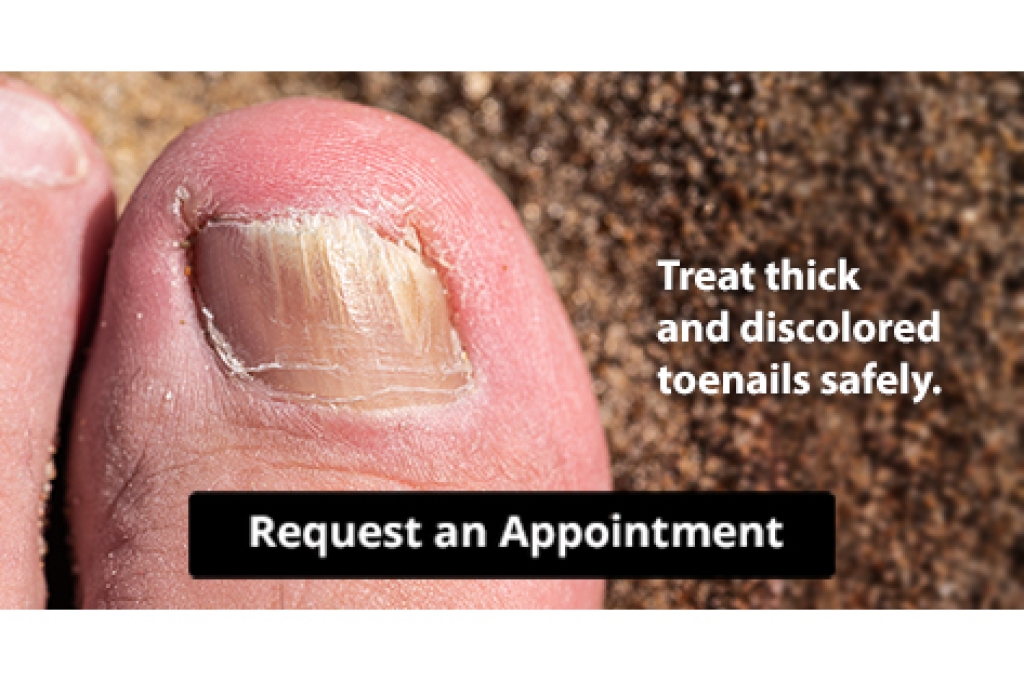Blog
How Heel Pain Can Be Treated
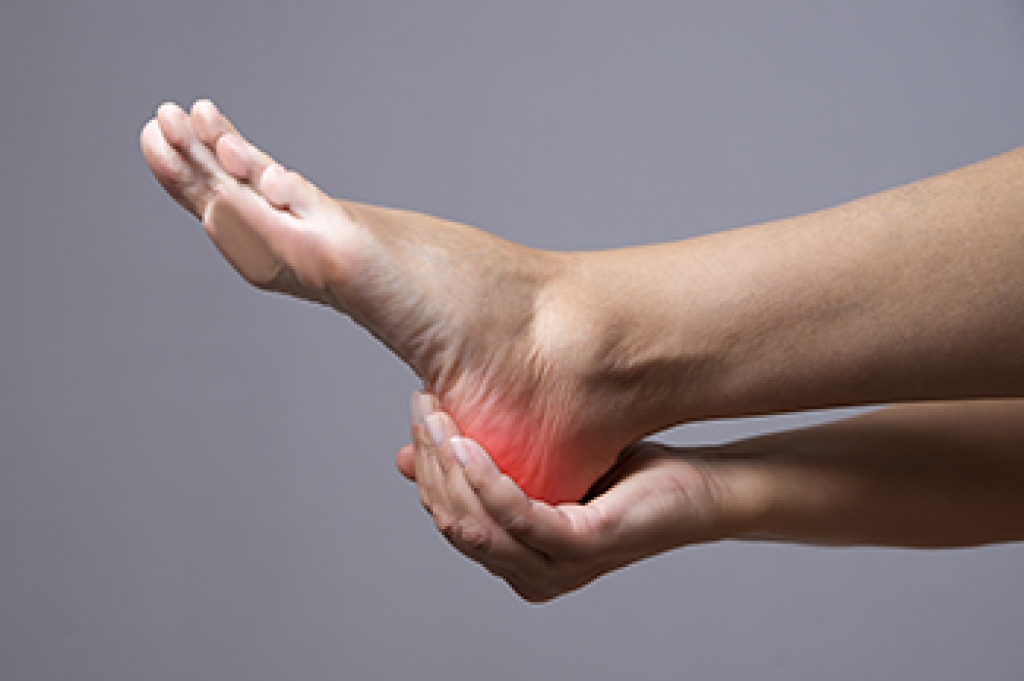
Heel pain, a common foot ailment, can disrupt daily activities and signal underlying issues. Typically stemming from conditions like plantar fasciitis, Achilles tendonitis, or heel spurs, it manifests as discomfort or tenderness beneath or behind the heel. Treatment often involves a combination of conservative measures, such as rest, stretching exercises, custom orthotic inserts, and supportive footwear to alleviate symptoms and promote healing. In some cases, nonsteroidal anti-inflammatory drugs or corticosteroid injections may be recommended for pain relief. However, if left unaddressed, heel pain can lead to chronic discomfort, mobility limitations, and even changes in gait. Additionally, persistent heel pain may indicate more serious conditions that require specialized intervention. If you have persistent or worsening heel pain, it is suggested that you schedule an appointment with a podiatrist for an individualized treatment plan that can expedite recovery and prevent complications.
Many people suffer from bouts of heel pain. For more information, contact one of our podiatrists of DeCaro Total Foot Care Center. Our doctors can provide the care you need to keep you pain-free and on your feet.
Causes of Heel Pain
Heel pain is often associated with plantar fasciitis. The plantar fascia is a band of tissues that extends along the bottom of the foot. A rip or tear in this ligament can cause inflammation of the tissue.
Achilles tendonitis is another cause of heel pain. Inflammation of the Achilles tendon will cause pain from fractures and muscle tearing. Lack of flexibility is also another symptom.
Heel spurs are another cause of pain. When the tissues of the plantar fascia undergo a great deal of stress, it can lead to ligament separation from the heel bone, causing heel spurs.
Why Might Heel Pain Occur?
- Wearing ill-fitting shoes
- Wearing non-supportive shoes
- Weight change
- Excessive running
Treatments
Heel pain should be treated as soon as possible for immediate results. Keeping your feet in a stress-free environment will help. If you suffer from Achilles tendonitis or plantar fasciitis, applying ice will reduce the swelling. Stretching before an exercise like running will help the muscles. Using all these tips will help make heel pain a condition of the past.
If you have any questions, please feel free to contact our office located in West Hatfield, MA . We offer the newest diagnostic and treatment technologies for all your foot care needs.
Sever’s Disease Affects Young Feet
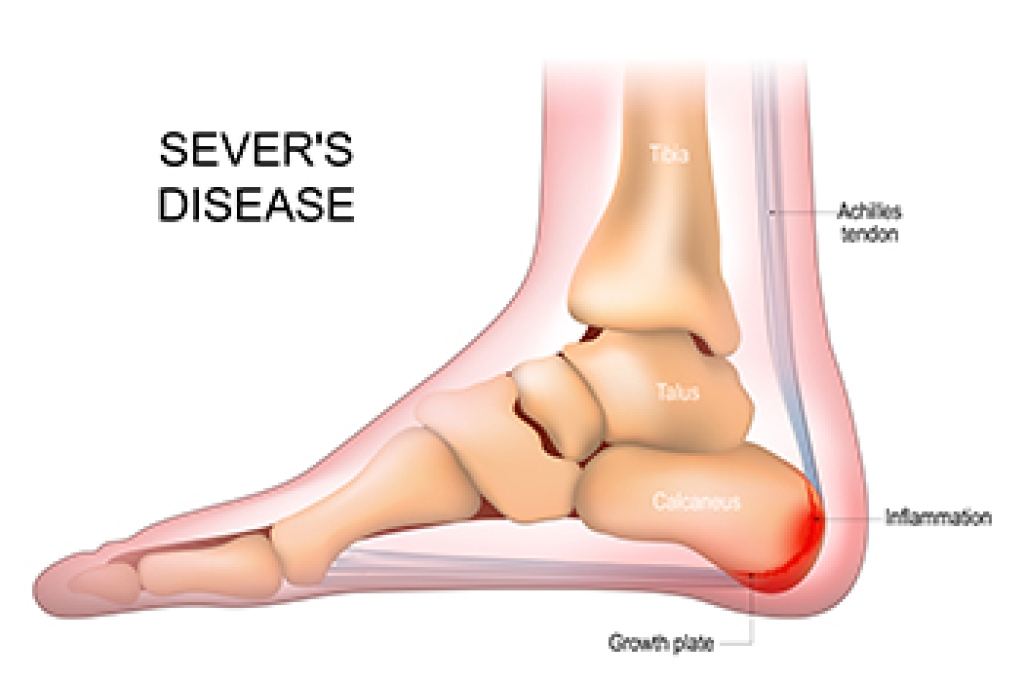
Sever's disease, also known as calcaneal apophysitis, is a common condition affecting children and adolescents, particularly those who are active in sports. Contrary to its name, Sever's disease is not a true disease but rather an inflammation of the growth plate in the heel bone. This inflammation occurs due to repetitive stress or tension on the growth plate, often during periods of rapid growth. As a result, the heel becomes painful and tender, especially during physical activities like running or jumping. Despite its discomfort, Sever's disease does not cause long-term damage and typically resolves once the growth plate closes. However, proper management is critical to alleviate symptoms and prevent recurrence. Treatment may involve rest, stretching exercises, wearing supportive footwear, and in severe cases, temporary activity modification. If your child has heel pain and enjoys participating in sporting activities, it is suggested that you consult a podiatrist who can accurately diagnose and treat Sever’s disease.
Sever's disease often occurs in children and teens. If your child is experiencing foot or ankle pain, see one of our podiatrists from DeCaro Total Foot Care Center. Our doctors can treat your child’s foot and ankle needs.
Sever’s Disease
Sever’s disease is also known as calcaneal apophysitis, which is a medical condition that causes heel pain I none or both feet. The disease is known to affect children between the ages of 8 and 14.
Sever’s disease occurs when part of the child’s heel known as the growth plate (calcaneal epiphysis) is attached to the Achilles tendon. This area can suffer injury when the muscles and tendons of the growing foot do not keep pace with bone growth. Therefore, the constant pain which one experiences at the back of the heel will make the child unable to put any weight on the heel. The child is then forced to walk on their toes.
Symptoms
Acute pain – Pain associated with Sever’s disease is usually felt in the heel when the child engages in physical activity such as walking, jumping and or running.
Highly active – Children who are very active are among the most susceptible in experiencing Sever’s disease, because of the stress and tension placed on their feet.
If you have any questions, please feel free to contact our office located in West Hatfield, MA . We offer the newest diagnostic and treatment technologies for all your foot and ankle injuries.
Types of Running Foot Strikes
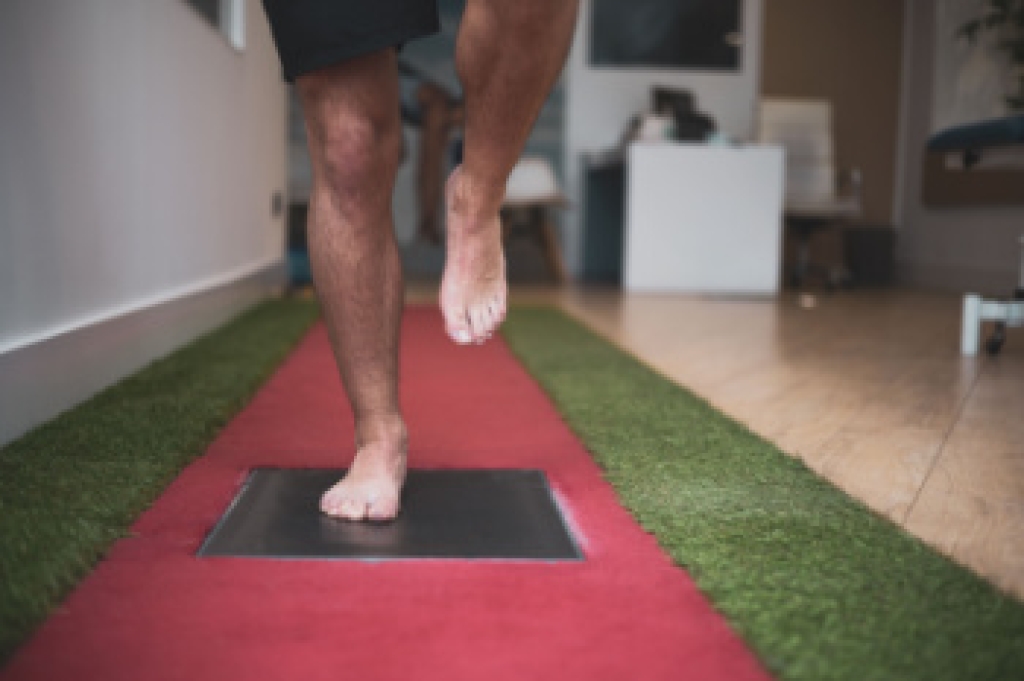
In the world of running, your feet interact with the ground in various forms, each influencing performance and potential for injury. There are several types of running foot strikes, depending upon the biomechanics of your feet. One is the heel strike, where the heel makes initial contact with the ground. While common, excessive heel striking may lead to impact-related injuries. Next, the midfoot strike involves landing on the middle part of the foot. This type distributes forces more evenly and is often associated with a smoother gait. Finally, the forefoot strike, where the ball of the foot hits the ground first, reduces the impact on joints but demands greater calf strength. Each type has its merits and drawbacks, and finding the right one can vary depending on terrain and personal preference. If you are interested in a gait analysis performed to determine your running foot strike, schedule an appointment with a podiatrist.
If you have any concerns about your feet, contact one of our podiatrists from DeCaro Total Foot Care Center. Our doctors can provide the care you need to keep you pain-free and on your feet.
Biomechanics in Podiatry
Podiatric biomechanics is a particular sector of specialty podiatry with licensed practitioners who are trained to diagnose and treat conditions affecting the foot, ankle and lower leg. Biomechanics deals with the forces that act against the body, causing an interference with the biological structures. It focuses on the movement of the ankle, the foot and the forces that interact with them.
A History of Biomechanics
- Biomechanics dates back to the BC era in Egypt where evidence of professional foot care has been recorded.
- In 1974, biomechanics gained a higher profile from the studies of Merton Root, who claimed that by changing or controlling the forces between the ankle and the foot, corrections or conditions could be implemented to gain strength and coordination in the area.
Modern technological improvements are based on past theories and therapeutic processes that provide a better understanding of podiatric concepts for biomechanics. Computers can provide accurate information about the forces and patterns of the feet and lower legs.
Understanding biomechanics of the feet can help improve and eliminate pain, stopping further stress to the foot.
If you have any questions please feel free to contact our office located in West Hatfield, MA . We offer the newest diagnostic and treatment technologies for all your foot and ankle needs.
How to Manage a Pinched Foot Nerve
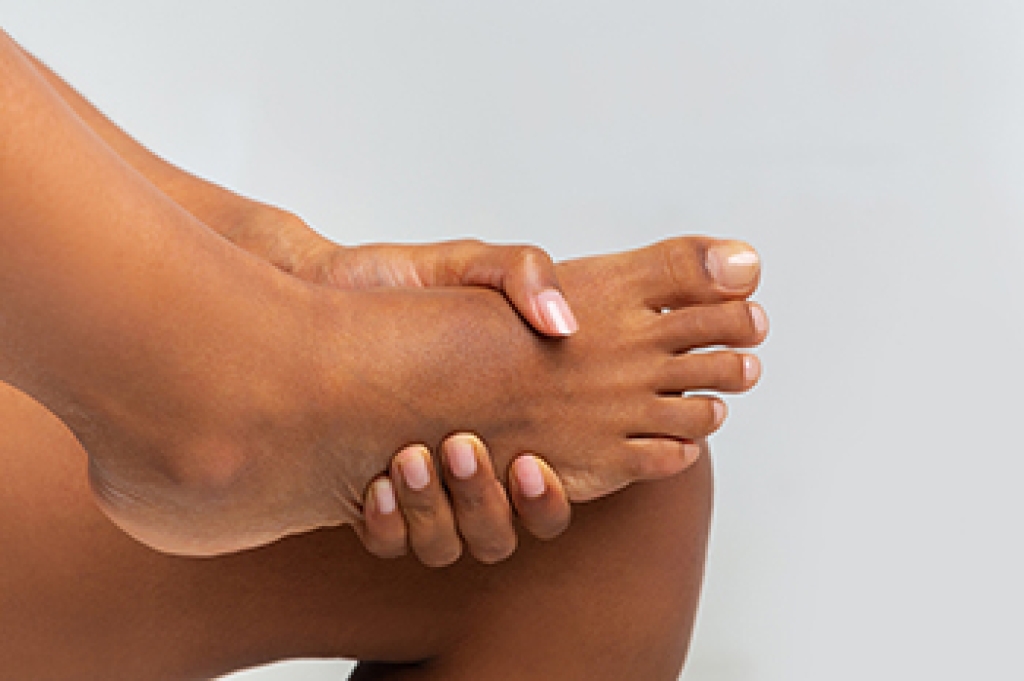
Pinched nerves in the feet, beyond tarsal tunnel syndrome, stem from diverse conditions, necessitating accurate diagnosis for effective treatment. Both Morton's neuroma, characterized by nerve thickening between toes, and hammertoes, involving abnormal toe bending, can compress nerves. Additionally, bunion formation at the big toe base can crowd and irritate nearby nerves. Nerve entrapment, resulting from injury or structural abnormalities, and peripheral neuropathy, often associated with diabetes, also contribute to nerve compression. Symptoms may encompass tingling, numbness, or burning sensations, affecting mobility and comfort. Precise diagnosis by a podiatrist is important for targeted intervention. Treatment may involve a combination of conservative measures, such as rest, and orthotic devices. In some cases, corticosteroid injections or surgical procedures may be necessary for relief. If you have the symptoms described above, it is suggested that you schedule an appointment with a podiatrist for a proper diagnosis and treatment.
Foot Pain
Foot pain can be extremely painful and debilitating. If you have a foot pain, consult with one of our podiatrists from DeCaro Total Foot Care Center. Our doctors will assess your condition and provide you with quality foot and ankle treatment.
Causes
Foot pain is a very broad condition that could be caused by one or more ailments. The most common include:
- Bunions
- Hammertoes
- Plantar Fasciitis
- Bone Spurs
- Corns
- Tarsal Tunnel Syndrome
- Ingrown Toenails
- Arthritis (such as Gout, Rheumatoid, and Osteoarthritis)
- Flat Feet
- Injury (from stress fractures, broken toe, foot, ankle, Achilles tendon ruptures, and sprains)
- And more
Diagnosis
To figure out the cause of foot pain, podiatrists utilize several different methods. This can range from simple visual inspections and sensation tests to X-rays and MRI scans. Prior medical history, family medical history, and any recent physical traumatic events will all be taken into consideration for a proper diagnosis.
Treatment
Treatment depends upon the cause of the foot pain. Whether it is resting, staying off the foot, or having surgery; podiatrists have a number of treatment options available for foot pain.
If you have any questions, please feel free to contact our office located in West Hatfield, MA . We offer the newest diagnostic and treatment technologies for all your foot care needs.
Changes in Feet During Pregnancy

Throughout pregnancy, the body adapts to accommodate the developing baby. The uterus enlarges, shifting the body's center of gravity forward and upward, improving stability and balance. Relaxin, a hormone mainly found in the third trimester, relaxes ligaments, causing the feet to lengthen, flatten, and widen. These foot changes can become permanent for some women. Additionally, the combination of structural adjustments, increased weight, and greater pressure on the lower limbs frequently leads to swelling in the legs and feet. Despite these transformations, proactive measures can mitigate discomfort and promote foot health during pregnancy. Opting for supportive footwear, elevating the feet when feasible, engaging in gentle exercises, and maintaining a healthy weight are advisable. If you are pregnant and experiencing concerning changes in your feet, it is suggested that you schedule an appointment with a podiatrist who can further aid in managing foot-related issues, as they offer tailored solutions to alleviate discomfort and support overall foot health throughout pregnancy and beyond.
Pregnant women with swollen feet can be treated with a variety of different methods that are readily available. For more information about other cures for swollen feet during pregnancy, consult with one of our podiatrists from DeCaro Total Foot Care Center. Our doctors will attend to all of your foot and ankle needs.
What Foot Problems Can Arise During Pregnancy?
One problem that can occur is overpronation, which occurs when the arch of the foot flattens and tends to roll inward. This can cause pain and discomfort in your heels while you’re walking or even just standing up, trying to support your baby.
Another problem is edema, or swelling in the extremities. This often affects the feet during pregnancy but tends to occur in the later stages.
How Can I Keep My Feet Healthy During Pregnancy?
- Wearing orthotics can provide extra support for the feet and help distribute weight evenly
- Minimize the amount of time spent walking barefoot
- Wear shoes with good arch support
- Wear shoes that allow for good circulation to the feet
- Elevate feet if you experience swelling
- Massage your feet
- Get regular, light exercise, such as walking, to promote blood circulation to the feet
If you have any questions please feel free to contact our office located in West Hatfield, MA . We offer the newest diagnostic and treatment technologies for all your foot and ankle needs.
Benefits of Orthotics for the Physically Active Person
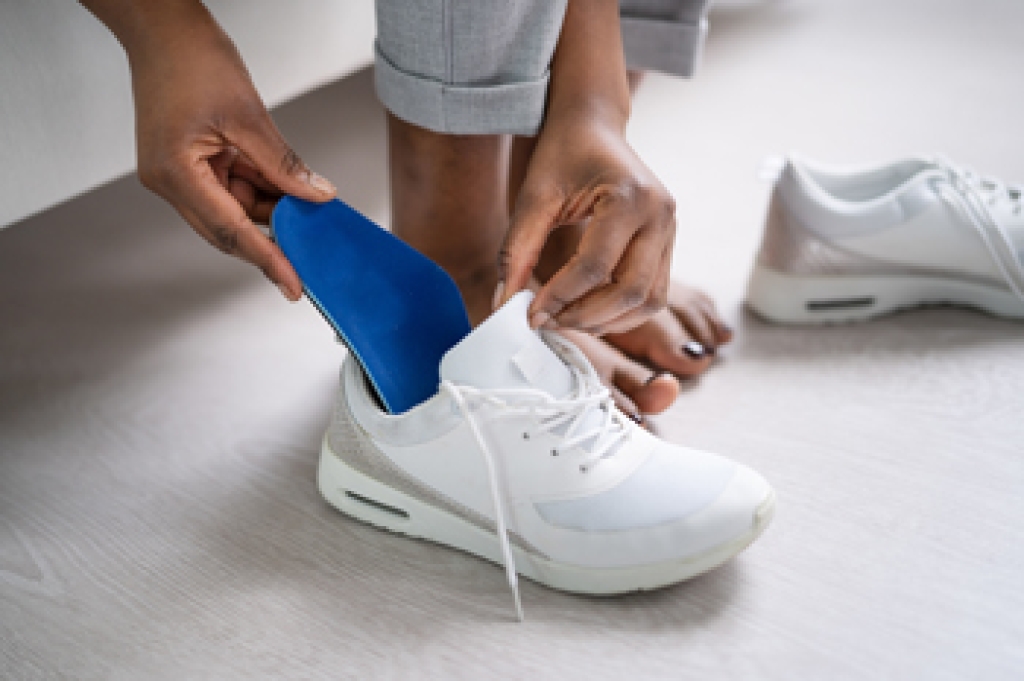
Custom-made orthotics offer significant benefits to individuals who are physically active by providing better alignment, balance, and improved mechanics. These orthotic shoe inserts are tailored to each individual's unique foot structure and biomechanics, ensuring optimal support and stability during physical activity. By correcting imbalances and redistributing pressure, custom orthotics help alleviate pain and reduce the risk of injuries, such as shin splints, plantar fasciitis, and stress fractures. Additionally, orthotics can improve gait efficiency, enhancing performance in activities, such as running, jumping, and sports. The precise fit and support offered by custom orthotics help maintain proper alignment of the feet, ankles, and lower limbs, minimizing strain on muscles and joints. If you are physically active, it is suggested that you make an appointment with a podiatrist to discuss if custom-made orthotics can support your active lifestyle and improve more comfortable performance.
If you are having discomfort in your feet and would like to try orthotics, contact one of our podiatrists from DeCaro Total Foot Care Center. Our doctors can provide the care you need to keep you pain-free and on your feet.
What Are Orthotics?
Orthotics are inserts you can place into your shoes to help with a variety of foot problems such as flat feet or foot pain. Orthotics provide relief and comfort for minor foot and heel pain but can’t correct serious biomechanical problems in your feet.
Over-the-Counter Inserts
Orthotics come in a wide variety of over-the-counter inserts that are used to treat foot pain, heel pain, and minor problems. For example, arch supports can be inserted into your shoes to help correct overarched or flat feet, while gel insoles are often used because they provide comfort and relief from foot and heel pain by alleviating pressure.
Prescription Orthotics
If over-the-counter inserts don’t work for you or if you have a more severe foot concern, it is possible to have your podiatrist prescribe custom orthotics. These high-quality inserts are designed to treat problems such as abnormal motion, plantar fasciitis, and severe forms of heel pain. They can even be used to help patients suffering from diabetes by treating foot ulcers and painful calluses and are usually molded to your feet individually, which allows them to provide full support and comfort.
If you are experiencing minor to severe foot or heel pain, it’s recommended to speak with your podiatrist about the possibilities of using orthotics. A podiatrist can determine which type of orthotic is right for you and allow you to take the first steps towards being pain-free.
If you have any questions please contact our office located in West Hatfield, MA . We offer the newest diagnostic and treatment technologies for all your foot and ankle needs.
Complete Foot Care
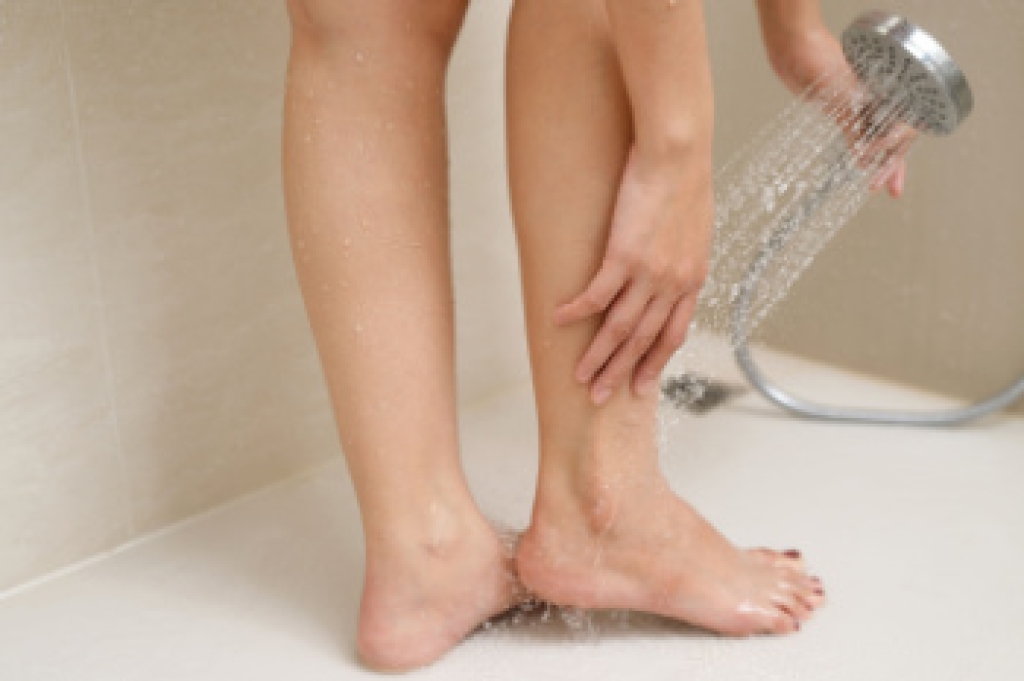
Maintaining healthy feet is essential for overall well-being. An easy foot care routine combines at-home care with professional guidance from a podiatrist. Start with regular at-home pedicures, soaking feet in warm water with Epsom salts to soften skin, followed by gentle exfoliation and moisturizing to prevent dryness and cracking. Trim toenails straight across to avoid ingrown nails and file them smooth. Seeing a podiatrist is equally important for comprehensive foot health. Regular check-ups with a podiatrist can detect early signs of issues like bunions, corns, or fungal infections. A podiatrist can also provide personalized advice on proper footwear, foot exercises, and preventive measures. If you want to invest time into taking proper care of your feet, it is suggested that you schedule an appointment with a podiatrist for thorough foot maintenance and early intervention for any underlying conditions.
Everyday foot care is very important to prevent infection and other foot ailments. If you need your feet checked, contact one of our podiatrists from DeCaro Total Foot Care Center. Our doctors can provide the care you need to keep you pain-free and on your feet.
Everyday Foot Care
Often, people take care of their bodies, face and hair more so than they do for their feet. But the feet are a very important aspect of our bodies, and one that we should pay more attention to. Without our feet, we would not be able to perform most daily tasks.
It is best to check your feet regularly to make sure there are no new bruises or cuts that you may not have noticed before. For dry feet, moisturizer can easily be a remedy and can be applied as often as necessary to the affected areas. Wearing shoes that fit well can also help you maintain good foot health, as well as making it easier to walk and do daily activities without the stress or pain of ill-fitting shoes, high heels, or even flip flops. Wearing clean socks with closed shoes is important to ensure that sweat and bacteria do not accumulate within the shoe. Clean socks help to prevent Athlete’s foot, fungi problems, bad odors, and can absorb sweat.
If you have any questions please feel free to contact our office located in West Hatfield, MA . We offer the newest diagnostic and treatment technologies for all your foot and ankle needs.
Ingrown Toenail Management
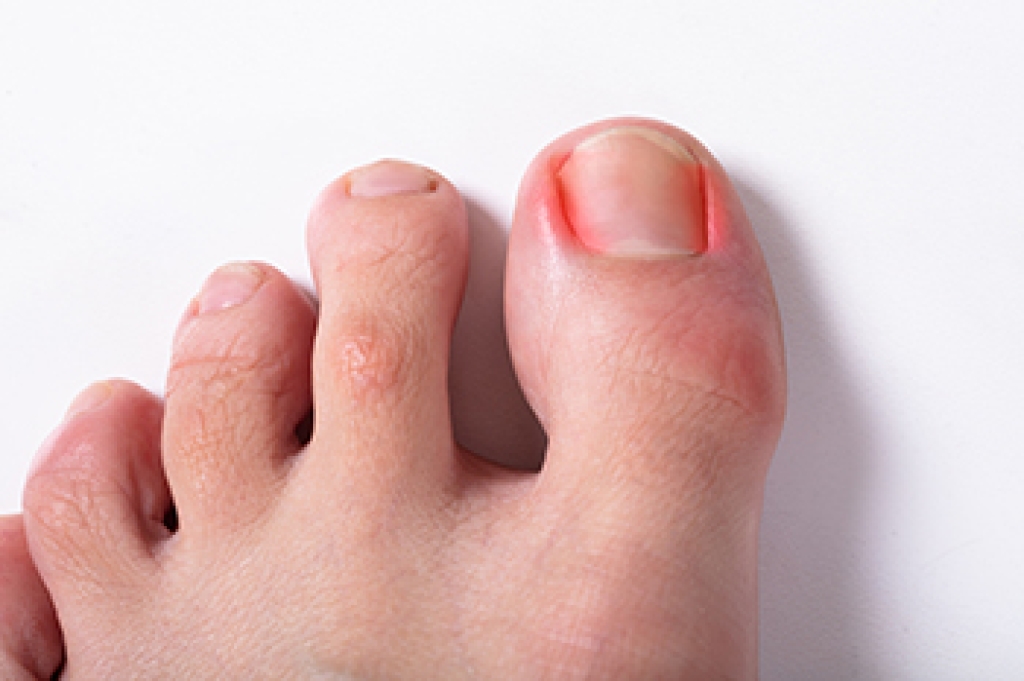
Ingrown toenails occur when the edge of the toenail grows into the surrounding skin, leading to pain, redness, and potential infection. Causes include improper nail trimming, tight footwear, injury, or genetic predisposition. To prevent ingrown toenails, it is important to cut nails straight across and avoid rounding the edges. Wearing properly fitted shoes that allow for ample toe room can also reduce the risk. Allowing toenails to breathe by wearing open-toed shoes occasionally promotes healthy nail growth and reduces pressure on the toes. If you have an ingrown toenail and the pain worsens or it appears infected, it is suggested that you seek prompt treatment from a podiatrist. This foot doctor can provide professional care, such as lifting the nail edge, prescribing antibiotics for infection, or performing a partial nail avulsion procedure if necessary.
Ingrown toenails can become painful if they are not treated properly. For more information about ingrown toenails, contact one of our podiatrists of DeCaro Total Foot Care Center. Our doctors can provide the care you need to keep you pain-free and on your feet.
Ingrown Toenails
Ingrown toenails occur when a toenail grows sideways into the bed of the nail, causing pain, swelling, and possibly infection.
Causes
- Bacterial infections
- Improper nail cutting such as cutting it too short or not straight across
- Trauma to the toe, such as stubbing, which causes the nail to grow back irregularly
- Ill-fitting shoes that bunch the toes too close together
- Genetic predisposition
Prevention
Because ingrown toenails are not something found outside of shoe-wearing cultures, going barefoot as often as possible will decrease the likeliness of developing ingrown toenails. Wearing proper fitting shoes and using proper cutting techniques will also help decrease your risk of developing ingrown toenails.
Treatment
Ingrown toenails are a very treatable foot condition. In minor cases, soaking the affected area in salt or antibacterial soaps will not only help with the ingrown nail itself, but also help prevent any infections from occurring. In more severe cases, surgery is an option. In either case, speaking to your podiatrist about this condition will help you get a better understanding of specific treatment options that are right for you.
If you have any questions please feel free to contact our office located in West Hatfield, MA . We offer the newest diagnostic and treatment technologies for all your foot and ankle needs.
